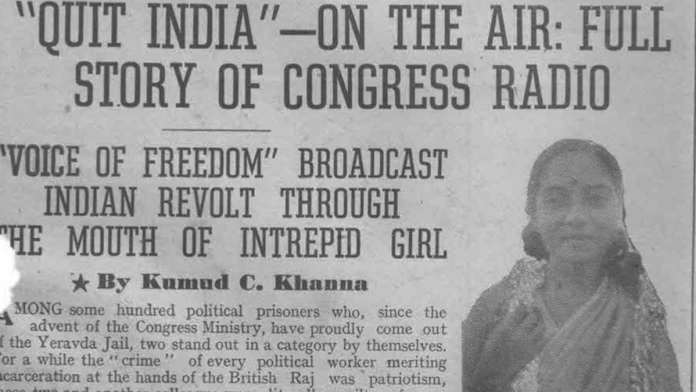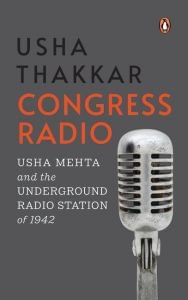
Ushaben remembered the day of the arrest as clearly as if it was yesterday. Recapturing that exciting time she said, ‘On 12 November 1942, the day of our arrest, all those involved with the Congress Radio held a meeting to discuss what we would do in case we were arrested. A number of prominent radio dealers in the city had been picked up just a week before. Through them the authorities learnt that Babubhai and Vithalbhai were the main persons behind the Congress Radio. We decided that at no cost would the names of any colleague or any other secrets be revealed to the police.
‘On 12 November at noon, the police raided Babubhai’s office. Many of us workers, including Chandrakantbhai Jhaveri and I were there. When we learnt that the police was arriving, we quickly cleared the office of all the files.
I then entered Babubhai’s office and innocently asked, “Bhai, what shall I tell Doctor (Dr Lohia) about Mother’s (transmitter’s) health?” He replied, “Tell him I cannot come today even though I know that Mother is serious. He may decide whether to change the prescription or continue with the same medicine.”
‘When the police asked Babubhai about me, he said, “She is my neighbour’s daughter. Her mother is sick and since there’s no male member in her family to look after her, I have to pitch in.” The officers seemed to be satisfied with the explanation and allowed me to leave. I rushed to the recording session where Vithalbhai was busy recording the day’s programme and the speeches of Dr Lohia and Harrisbhai. I apprised them of the latest events. We discussed the situation. Dr Lohia said, “The work must go on . . .” And I said, “Yes, the work must go on.”
‘In the meantime, news arrived that one of the technicians had been arrested. At first we thought we would not broadcast any programme that night. However, on second thought we decided to run one station and change the location of the other transmitter overnight. We felt that it was our duty as disciplined soldiers to face the impending danger. I left the recording station with a firm resolve that the programme would start on schedule. I went home and informed my mother and brothers about the possibility of the radio station being raided that night. My brothers, Janakbhai and Chandrakantbhai, were both active in the struggle.
‘When I was leaving for the broadcasting station as usual, Chandrakantbhai Jhaveri accompanied me. He was fully aware of the risk, but came with me in spite of my repeated requests not to do so, saying, “How can I allow you to walk straight into the tiger’s open jaws?” I was deeply touched by his act.
‘I asked him to stand outside, near the entrance, and knock three times in case he sensed any danger. I then entered the broadcasting room, switched on the transmitter and relayed the whole programme. Ultimately when I was putting on the “Vande Mataram” record, I heard hard knocks on the door. I thought Chandrakantbhai was warning me, but instead of him, I saw a big battalion of policemen headed by the deputy commissioner of police entering the room with triumphant smiles on their faces. They were accompanied by some military technicians, and our own chief technician, Printer. When they entered, the “Vande Mataram” record was still on. So, they asked Printer as to who was operating the transmitter. On his pointing at me, the police chief said in a commanding tone, “Stop the record.” I not only refused to obey the order but mustering all the courage at my command, firmly replied, “The record will not stop. This is our national song. So all of you stand at attention.” And lo and behold! One and all of them, including the chief, did stand at attention.
‘We wanted to announce the news of the spectacular raid, of being betrayed by our chief technician who led the police to this station and of our arrest at the post of duty. But this traitor of the technician came to the rescue of the police by tampering with the fuse. Of course, our colleagues, who were listening to the radio, did get a hint of what was happening when they heard the breaking open of the doors. When the fuse blew, the lights went out, making the police extremely edgy. They took quite some time to get hold of a hurricane lamp and then began the arrest formalities. A list of all the equipment found on the premises was prepared and the panchas were called in. The watchman of the building was summoned as one of the panchas. He protested to the police, “Saab, hum toh garib log hain. Hum kya samjhe in baaton ko?” (Sir, we are poor people. How do we understand these things?) The police tried to coerce him, but he refused to believe that there was a transmitter in the room.
‘“How do I know what a transmitter is?” he said. The policeman shouted back, “You fool, don’t you realize that it can blurt out some songs?” Amidst laughter the dear old man said, “How can a wooden piece sing?” It was only when I told him that there was no harm in his signing that he put his initials on the panchnama, albeit very reluctantly.
‘The arrest formalities took nearly three and a half hours. When Chandrakantbhai and I finally stepped out of the room, we found that there were policemen waiting for us at each and every step all the way down. I said to Chandrakantbhai, “Bhai, we do not know whether we will ever get such a reception again, but today we are getting a Guard of Honour—and that too from the rifled policemen!” He was equally unperturbed and reacted saying, “Yes, this is certainly a memorable day for us.”’
Charges Against the Accused
When the investigations were complete, the government directed that Special Judge N.S. Lokur should try the case against the five accused, and on 2 April 1943 accorded sanction under Section 196A of the Criminal Procedure Code for their prosecution for the offence of criminal conspiracy punishable under Section 120-B of the Indian Penal Code (IPC).
 This excerpt from ‘Congress Radio: Usha Mehta and the Underground Radio Station of 1942’ by Usha Thakkar has been published with permission from Penguin Random House India.
This excerpt from ‘Congress Radio: Usha Mehta and the Underground Radio Station of 1942’ by Usha Thakkar has been published with permission from Penguin Random House India.
Subscribe to our channels on YouTube & Telegram
Why news media is in crisis & How you can fix it
India needs free, fair, non-hyphenated and questioning journalism even more as it faces multiple crises.
But the news media is in a crisis of its own. There have been brutal layoffs and pay-cuts. The best of journalism is shrinking, yielding to crude prime-time spectacle.
ThePrint has the finest young reporters, columnists and editors working for it. Sustaining journalism of this quality needs smart and thinking people like you to pay for it. Whether you live in India or overseas, you can do it here.